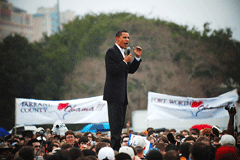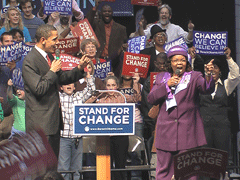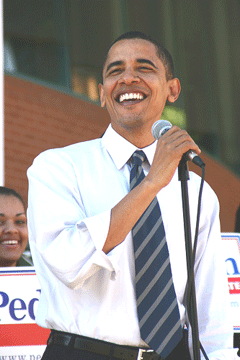Obama on Climate Change
Air Date: Week of February 1, 2008

(Photo: Flickr/an agent)
Living on Earth's Jeff Young takes a hard look at Senator Barack Obama's record and platform on global warming. Environmentalists generally give him high marks. But they also raise a few questions about the Illinois senator's connections to the coal and nuclear industries.
Transcript
GELLERMAN: From the Jennifer and Ted Stanley Studios in Somerville, Massachusetts - this is Living on Earth. I’m Bruce Gellerman, in for Steve Curwood.
And then there were two. It’s down to Senators Barack Obama and Hillary Clinton in the democratic presidential primaries.
All along the campaign trail, voters have been asking the candidates how they plan to tackle global warming. Here at Living on Earth, we’ve been asking presidential hopefuls the same question – this week it’s Barack Obama's turn. His plan wins high marks from some environmentalists. But his connections to the coal and nuclear industries also raise a few eyebrows. Living on Earth’s Jeff Young has our report.
[CHEERING AT DEMOCRATIC NATIONAL CONVENTION]
YOUNG: Boston, July 27, 2004: the democratic national convention. In just a few hours, a self described skinny guy with a funny name, Barack Obama, will deliver an electrifying keynote speech here, catapulting him from obscure state senator to national political prominence.
But first, Obama visits Boston harbor, and a small crowd of environmental activists. He thanks them for making his U.S. Senate run possible.
OBAMA: Now we had a lot of important moments in this race, but one of the key moments was when we got the support of the League of Conservation Voters.

Senator Obama rallies in Greenwood, South Carolina.(Photo: Flickr/Obama)
KARPINSKI: When we got in the race, I think he was in third or fourth place in a multi-candidate primary. But we invested heavily in that race, we touted his environmental record, he won that primary, and then he won going away in the general. So we really had a new friend in Congress, a new leader in Congress on the environment, that we really helped get there.
YOUNG: Do you feel that investment has paid off? Has Senator Obama lived up to your expectations as a senator?
KARPINSKI: Well clearly Senator Obama’s record since he’s been in the Senate has been very, very strong. His lifetime score is a 96 percent. It’s been very strong particularly as he’s been campaigning on the most important issue, the issue of global warming.
OBAMA: The days of debate about whether the globe is getting warmer are over. There are about two holdouts left in the Bush white house.
YOUNG: On the campaign trail Obama makes frequent mention of his global warming plan, but rarely goes into details. He would use a cap and trade law with aggressive targets to cut greenhouse gas emissions 80 percent below 1990 levels by mid century. Obama would make polluting companies purchase the credits to emit CO2. He’d use that money to invest in green technology and help low-income people meet energy needs. He also sets ambitious targets for energy efficiency and renewable electricity. As for transportation fuels, he’d push a low carbon fuel standard.

Sen. Barack Obama spoke at a rally for senate candidate Jim Pederson at Arizona State University on Nov. 12. (Photo: Flickr/basile12)
[CHEERS FADE OUT]
YOUNG: That sounds good to environmentalists. But it doesn’t sound all that different from his Democratic competitor Hillary Clinton. Bob Sussman, a former high-ranking official in President Bill Clinton’s Environmental Protection Agency is now an environment advisor to the Obama campaign.
SUSSMAN: Well I wouldn’t say that the platforms are dramatically different, at least as compared to Senator Clinton. One thing that sets Senator Obama apart is his long-standing commitment to these issues. These are issues that he has worked tirelessly on since his days in the Illinois state legislature.
YOUNG: As a state senator, Obama got a perfect score from Illinois environmental watchdogs. And in his first year in the US Senate, Obama faced tough choices on the environment. For example, labor and industry groups from the coal-producing region of southern Illinois wanted Obama to support the Bush administration’s Clear Skies proposal. Environmentalists, like Karpinski, said it would weaken clean air protections.
KARPINSKI: Certainly Senator Obama was getting a lot of pressure from the down-state coal industry, but to his credit we worked closely with him, and he became a real champion in opposing the Clear Skies - the so-called Clear Skies Act from President Bush.
YOUNG: However, Obama has come under fire for voting with Republicans on an energy bill in 2005. It gave massive subsidies to many forms of energy, including nuclear power. Obama defended that vote to Tim Russert during this presidential debate broadcast by MSNBC.
RUSSERT: Did you realize when you were voting for that energy bill, that it was going to create such a renaissance of nuclear power?
OBAMA: Well, the reason I voted for it was because it was the single largest investment in clean energy - solar, wind, biodiesel - that we had ever seen. Now, with respect to nuclear energy, what I have said is that if we could figure out a way to provide a cost-efficient, safe way to produce nuclear energy, and we knew how to store it effectively, then we should pursue it because what we don't want is to produce more greenhouse gases.
YOUNG: Obama’s also proposed a controversial use of coal. Last year, he co-sponsored a bill to make a liquid fuel from coal that could be used as a gasoline substitute.

AUSTIN, TX - Sen. Barack Obama speaks to a crowd of about 15,000 in the light rain at Auditorium Shores. (Photo: Flickr/an agent)
YOUNG: That’s Frank O’Donnell of the group Clean Air Watch. Obama later said he would only support liquid coal if the final product produced less CO2 than gasoline. But O’Donnell says the liquid coal bill is not Obama’s only coal connection.
O’DONNELL: For example, in Nevada one of his advisors was a fellow named Vasiledes, a PR man who was also simultaneously the PR man and ad man for the coal lobby’s attempt to make itself look good. And so people were raising the question there, isn’t he at least a bit uncomfortable to be consorting with coal company types?
YOUNG: The clean coal public relations crews have become regulars at Obama campaign rallies. I ran into Tim Kelly outside an Obama event. He was wearing a T-shirt showing a power cord plugged into a lump of coal.
KELLEY: It’s America’s power. What we do is we promote clean coal technology and the continued use of coal in producing electricity. This is probably the second or third Obama rally I’ve been to, and Obama’s supportive of some of our same goals. He believes we have to continue to use coal.
YOUNG: But Obama campaign advisor Bob Sussman says critics like O’Donnell are making too much of a few industry connections.
SUSSMAN: Well I don’t think there’s much of a connection there to worry about.
YOUNG: Sussman himself aside from working at the EPA, spent much of his career as a lobbyist and lawyer for the firm Latham and Watkins. The firm represented coal power companies in their attempts to influence Bush administration rules on mercury emissions and changes to the clean air act.
SUSSMAN: That’s true. I did work for different folks in the energy industry, and I don’t consider that to be a bad thing, but it’s not a factor at all in anything that I’m doing for Senator Obama now. Senator Obama’s been very clear that he doesn’t want lobbyists involved in his campaign. That’s an excellent line to draw, but people who have worked for industry understand how industry works, and have expertise on these issues, have an awful lot to contribute and they should have a seat at the table along with everybody else.
YOUNG: And that’s an argument that O’Donnell at Clean Air Watch says he can understand when he sums up Senator Obama’s environmental record.
O’DONNELL: The guy has got on the whole a great platform. He’s raised some questions because of his flirtation with coal, and it may be his flirtation with coal may be a microcosm of the reality that you can’t deal with some of these issues like global warming without giving a nod to coal. Now a lot of us wish that weren’t the case, but maybe that’s the practical reality as things ultimately unfold.
YOUNG: After all, coal, which provides about half the country’s electricity, is not likely to go away any time soon. For Living on Earth, I’m Jeff Young in Washington.
GELLERMAN: Hey Jeff, stick around for a moment, okay. I want to talk to you about what’s happening in the republican race, because global warming has been getting some pretty prominent play there, too.
YOUNG: It has. Mitt Romney has really been going after Senator McCain on this. Of course, McCain was the first to propose a cap on carbon emissions, and Romney’s really been on the attack, saying this means McCain’s not a real conservative. He’s putting the economy at risk through increasing energy prices. McCain shoots back that he will trust American entrepreneurs to rise to this challenge and create green energy jobs.
GELLERMAN: So what effect if any do you think this is having?
YOUNG: I think it’s having a big effect, and I think McCain comes out the winner on the whole on this. And the way that’s paying off for him is in the form of some very important endorsements in some very key states.
GELLERMAN: You mean like California Governor Arnold Schwarzenegger endorsing John McCain?
YOUNG: That’s exactly what I mean, and you know the symbolism of the setting of that endorsement could not be more important. They were touring a solar power facility when Schwarzenegger makes his endorsement of John McCain, underscoring the importance of tackling climate change, and creating these you know green energy jobs. And this also paid off for McCain in Florida, where Governor Charlie Christ, another Republican who has taken action to cap greenhouse gases, focus on green energy, endorsed John McCain. And it’s a big reason why John McCain won Florida. It seems unlikely, but I really think that global warming is turning into the stealth issue, and it’s a big part of who’s going to win the Republican nomination.
GELLERMAN: Hmm, Interesting. Well thanks a lot, Jeff.
YOUNG: You’re welcome.
GELLERMAN: Living on Earth’s Washington correspondent Jeff Young. And be sure to check out our website, L-O-E dot org, for our coverage of the presidential race and the environment.
Links
Sen. Obama's campaign campaign website has details on his global warming and energy plan
More about the candidates' environmental records from the League of Conservation Voters
Check out LOE's full election coverage, including profiles of the leading candidates
Living on Earth wants to hear from you!
Living on Earth
62 Calef Highway, Suite 212
Lee, NH 03861
Telephone: 617-287-4121
E-mail: comments@loe.org
Newsletter [Click here]
Donate to Living on Earth!
Living on Earth is an independent media program and relies entirely on contributions from listeners and institutions supporting public service. Please donate now to preserve an independent environmental voice.
NewsletterLiving on Earth offers a weekly delivery of the show's rundown to your mailbox. Sign up for our newsletter today!
 Sailors For The Sea: Be the change you want to sea.
Sailors For The Sea: Be the change you want to sea.
 The Grantham Foundation for the Protection of the Environment: Committed to protecting and improving the health of the global environment.
The Grantham Foundation for the Protection of the Environment: Committed to protecting and improving the health of the global environment.
 Contribute to Living on Earth and receive, as our gift to you, an archival print of one of Mark Seth Lender's extraordinary wildlife photographs. Follow the link to see Mark's current collection of photographs.
Contribute to Living on Earth and receive, as our gift to you, an archival print of one of Mark Seth Lender's extraordinary wildlife photographs. Follow the link to see Mark's current collection of photographs.
 Buy a signed copy of Mark Seth Lender's book Smeagull the Seagull & support Living on Earth
Buy a signed copy of Mark Seth Lender's book Smeagull the Seagull & support Living on Earth

